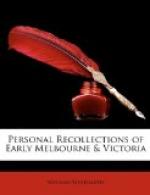The same political feature, and even in more resolute form, had then developed also at Sydney, where Mr. Wentworth led the “upper ten,” for the protection of authority against levelling radicalism. He and his party, out-Heroding Herod, and being more governmental than the Government, seriously contemplated a limitation of the franchise to a 50 pounds rental, and the institution of a Colonial Peerage, as a permanent slap in the face to the ugly Democracy. Had he carried his views, or even some considerable approach to them, his influence with the party, and his bull-dog courage, would soon have put his colony into an uproar, and possibly even into civil war. But, thanks for once to his political extremes, the question was happily settled rather by being laughed out of court than by time-wasting argument.
“Government House,” however, did secure, in both colonies, a certain measure of triumph. Authority in esse having the whip hand of authority in posse, the one-third of nominees as against two-thirds elective were, by a disproportionately large representation purposely given to the squatting districts, converted into a permanent majority of Crown nominees and Crown tenants. This was clearly an evasion of the intention of the Imperial Parliament, which was that, by giving a decided majority to the popular side, the colonies might be graduated into complete constitutionalism.
But, after all, this evasion lasted only for a very few years. These early wranglings are now all but forgotten. But they are so only because the narrow views which gave them birth have been entirely defeated, and are all but exploded. In the progress of the colonies since, “the merits” have occupied the front, and the useful has taken the precedence of the ornamental. The latter is not to be despised when in company with the former; nor has it been, for not a few who were once on the anti-popular side have entered public life, and even secured the highest prizes. This necessitated a descent from cloudland to the solid ground of colonial society. The alternative was extinction, and wisely, in most cases, the latter was not preferred.




